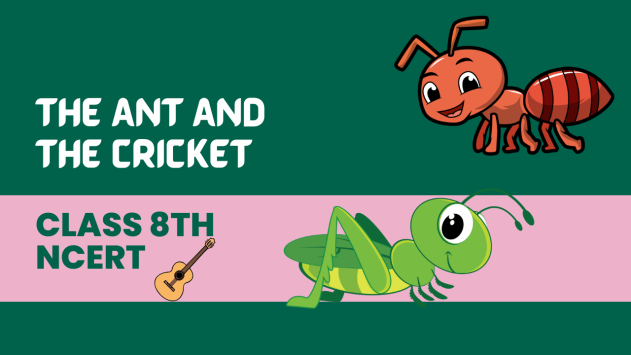Poems are a beautiful way to express your inner feelings and express your deep thoughts in a few words. We have shared The Ant And The Cricket Class 8th Honeydew Summary along with The Ant And The Cricket Class 8th NCERT Solutions and The Ant And The Cricket Class 8th MCQs and RTC.
We have shared all about The Ant And The Cricket Class 8th Honeydew along with The Ant And The Cricket Class 8th Honeydew word meanings to help the students with the meaning of the poem and to make them understand the synopsis of the poem.
The Ant And The Cricket Class 8th: Summary
The poem begins with a story of a silly, careless, young cricket who used to sing all day and night in the days of summer and spring. But as soon as winter appears, his cupboard was empty and he was left with nothing to eat.
As soon as winter came, he complained about his empty cupboard as he was left with no provision. On the snow-covered ground, he started finding some crumbs to eat. he could not find any place to hide from the snowfall and winters.
He was worried as to what will happen now without shelter and food. He was all drenched in rain, famishing, and then he decided to seek help from the ant. He wanted to borrow and also told them that he will repay. He longed for a mouthful of grain and shelter.
The ant had a policy of no borrowing and no lending. The ant then questioned the cricket about his timetable during the summer and spring. The ant then gave them the advice to him to dance and sing in a similar way in winter too.
The ant then bangs the door in front of him. The poet actually taught a life lesson through this beautiful poem. We all should do our work on time and also plan for the future.
The Ant And The Cricket Class 8th Honeydew: Word Meanings
- Famine- extreme scarcity of food
- Trembling- shaking or quivering, typically as a result of anxiety, excitement or weakness
- Miserly- small
- Fable- a short story, typically with animals as characters, conveying a moral
- Warrant- justify
The Ant And The Cricket Class 8th Honeydew: NCERT Solutions
Page No: 23
Working with Poem
Question 1:
The cricket says, “Oh! What will become of me?” When does he say it, and why?
Solution:
The cricket said the given line when it found that its cupboard was empty and winter had arrived. It could not find a single crumb to eat on the snow-covered ground and there were no flowers or leaves on the tree. It wondered what would become of it because it was getting cold and since there was nothing to eat,it would starve and die.
Question 2:
(i) Find in the poem the lines that mean the same as “Neither a borrower nor a lender is” (Shakespeare).
(ii) What is your opinion of the ant’s principles?
Solution:
(i) The lines in the poem that means the same as “Neither a borrower nor a lender be” are ‘But we ants
never borrow; we ants never lend.’
(ii) Iagreewithwhattheant says first that one should save something or the futures that he does not
need to borrow or lend. Maybe he knows cricket very well that he was a lazybones and does not work.
But I don’t agree with the ant’s principle what he told me later. If he says he is a friend of cricket then he should also help the cricket in times of distress. On the other hand, I believe that a friend in need is a friend indeed.
Question 3:
The ant tells the cricket to “dance the winter away”. Do you think the word ‘dance’ is appropriate here? If so, why?
Solution:
The ant told the cricket to“dance the winter away” because when it asked the cricket what it did in the past summers and why it had not stored any food for summers, the cricket answered that it sang through the warm and sunny months of summers. Therefore, in reply to this, the ant asked the cricket to“dance” the winter away just like it“sang” all through the summers and did not bother to store food for winter. The word dance is appropriate to use here for a careless, irresponsible person like the cricket who is least bothered by the rainy day and keeps enjoying his life.
Question 4:
(i) Which lines in the poem expresses the poet’s comment? Read them aloud.
(ii) Write the comment in your own words.
Solution:
(i) The lines in the poem that express the poet’s commentary“Folks call this a fable. I’ll warrant it true.”
(ii) This comment by the poet means that this poem is indeed a fable as it had a moral behind it. The cricket did not have anything to eat during the winters because it did not bother to store some food during the summers. It was negligent and sang all through the summers. The ant, on the other hand, had built a nice home for itself and had stored food so that it would not starve during winters. I worked hard during summers to achieve this. Thus, the moral of the poem is to be prepared for adverse times and always work hard instead of being negligent. Or else face the consequence like cricket.
The Ant And The Cricket Class 8th: MCQs and RTC
We have shared The Ant And The Cricket Class 8th MCQs and RTC to help the students with the lesson so that class 8th students could get the proper gist of the lesson and boost their preparation. MCQs help the students with the minute detail of the chapter and help the students with the skimmed portion of the chapter.
Read the stanzas carefully and answer the questions that follow. Tick the correct alternative:
(1)
Says the ant to the cricket, “I’m your servant and friend, But we ants never borrow, we ants never lend. But tell me, dear cricket, did you lay nothing by When the weather was warm?” Quoth the cricket, “Not” ! My heart was so light. That I sang day and night, For all nature looked gay.” “You sang, Sir, you say? Go then”, says the ant, “and dance winter away.”
Question 1.
I’m your servant and friend. What does ‘I’ refer to?
(a) Cricket
(b) Ant
(c) Rain
(d) Poet
Answer
Answer: (b) Ant
Question 2.
What did the ant say to the cricket?
(a) They never borrow
(b) They never lend
(c) They neither borrow nor lend
(d) None of these
Answer
Answer: (c) They neither borrow nor lend
Question 3.
‘Dance the winter away’, who said to whom?
(a) Cricket to Ant
(b) Poet to cricket
(c) Ant to cricket
(d) Poet to ant
Answer
Answer: (c) Ant to cricket
Question 4.
What is the meaning of ‘quoth’.
(a) told
(b) asked
(c) quoted
(d) said
Answer
Answer: (d) said
(2) A silly young cricket, accustomed to singing, Through the warm, sunny months of gay summer and spring, Began to complain when he found that, at home, His cupboard was empty, and winter came. Not a crumb to be found On the snow-covered ground; Not a flower could he see, Not a leaf on a tree. “Oh! what will become,” says the cricket, “of me?”
Question 1.
Name the poem.
(а) Geography Lesson
(b) The Ant and the Cricket
(c) Macavity: The Mystery Cat
(d) The Last Bargain
Answer
Answer: (b) The Ant and the Cricket
Question 2.
Why was the young cricket called silly?
(a) He was lazy
(b) He was always sleepy
(c) He did not think for winters
(d) None of these
Answer
Answer: (c) He did not think for winters
Question 3.
What did he do during the summer and spring?
(а) He sang during the summer
(b) He sang during summer and spring
(c) He sang during spring
(d) He sang during summer and worked during spring
Answer
Answer: (b) He sang during summer and spring
Question 4.
‘Oh! What will become of me?” Who said this?
(a) Ant
(b) Cricket
(c) Poet
(d) Tree
Answer
Answer: (b) Cricket
(3) At last starvation and famine made boldly, All dripping with wetness, and all trembling with cold, Away he set off to a miserly ant, To see if, to keep him alive, he would grant He shelters from the rain, And a mouthful of grain. He wished only to borrow; He’d repay it tomorrow; If not, he must die of starvation and sorrow.
Question 1.
What happened to the cricket?
(a) He suffered from illness
(b) He suffered from famine
(c) He suffered from starvation and famine
(d) None of these
Answer
Answer: (c) He suffered from starvation and famine
Question 2.
To whom did he go?
(a) Ant
(ib) Bee
(c) Cricket
(d) Rain
Answer
Answer: (a) Ant
Question 3.
What did the cricket want to ask the ant?
(a) He wanted some grains
(b) He wanted shelter and some grain for himself
(c) He wanted his shelter
(d) None of these
Answer
Answer: (b) He wanted shelter and some grain for himself
Question 4.
Which word in the passage means ‘suffering from hunger.
(a) dripping
(b) trembling
(c) sorrow
(d) starvation
Answer
Answer: (d) starvation
Conclusion
We have penned down The Ant And The Cricket Class 8th Honeydew Summary along with The Ant And The Cricket Class 8th NCERT Solutions and The Ant And The Cricket Class 8th MCQs and RTC. We have shared all about The Ant And The Cricket Class 8th Honeydew along with The Ant And The Cricket Class 8th Honeydew word meanings.
Related Articles

